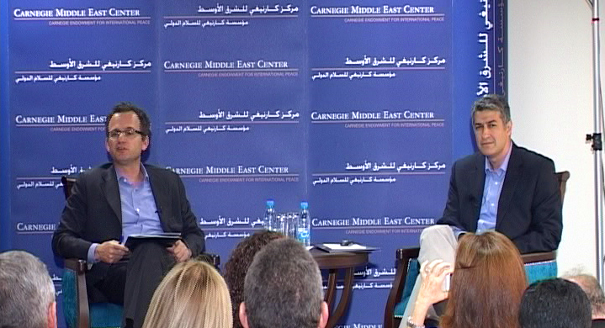Registration
You will receive an email confirming your registration.
The Arab Spring has created new realities in the Middle East and has spurred much speculation as to what the future holds for the Arab world. At a regional book launch event hosted by the Carnegie Middle East Center, Wissam Yafi, a technologist and international development expert, presented the key hypothesis of his upcoming book, Inevitable Democracy in the Arab World (Palgrave MacMillan, 2012) arguing that change in the region is proving to be inevitable. Carnegie’s Paul Salem moderated the discussion.
Dynamics Leading to Change
Yafi listed four dynamics leading to inevitable change in Arab world:
- Geo-economic: Yafi warned that a significant geo-economic dip is taking place in the Arab world. Fiscal pressure will force nondemocratic governments to make dramatic cuts to social services, which will likely lead to even higher levels of unemployment. Citizens will, as a result, be motivated to look for democratic alternatives to the status quo. Yafi pointed to the 2010 Tunisia Sidi Bouzid Revolt as an example, noting that before the revolt, 46 percent of Tunisia’s young graduates did not have a job eighteen months after graduation.
- Geo-social: As the populations of the Arab world increase, so will geo-social pressures, Yafi argued. The Arab world has one of the fastest growing populations in the world, with rapid urbanization in a region expected to house 450 million by 2020. To keep pace, one million new jobs every year are necessary. Yafi stated that this population explosion is very difficult to reverse in the short term and has coincided with an increase in human development in the MENA region, which means heavier fiscal burdens on already over-stretched governments. As literacy rates continue to go up for men, women, and youth, they are bound to demand better answers to high unemployment rates, which will be even more exasperated as women become more visible in the work force, he added.
- Technological: Technology has become the great enabler in the Arab World, with major changes in mass communication connecting people both within countries and across the region, Yafi explained. Access to social media sites, such as Facebook, will continue to help instigate democratic transitions. As technology becomes readily available, governments will no longer be able to censor their populations, Yafi predicted.
- Geo-political: In many Arab states, leaders use state handouts to buy compliance from their citizens, Yafi said. This constitutes a failed social contract that denies citizens the ability to determine their own futures. Yafi predicted that a new social contract will develop which encourage self-determination and self-sufficiency. He warned that the transition to this new democratic social contract would not necessarily be smooth, due to potential short-term counter-revolutionary reverberations.
Yafi argued that these four factors when taken together are creating a dynamic that will continue to shape the region challenging the status quo. There are a limited number of alternatives to the status quo, Yafi said; there is anarchy, neo-dictatorship, liberalized autocracy, theocracy, or democracy. Yafi concluded that democracy is the only political system that will be able to adequately support the changes already sweeping through the region thus providing the masses with the answers to their predicament. Policy recommendations were hence provided in order to find ways (geo-economic, geo-social, and geo-political) to support the region so as to cushion this inevitable transformation to democracy in the Arab world.
